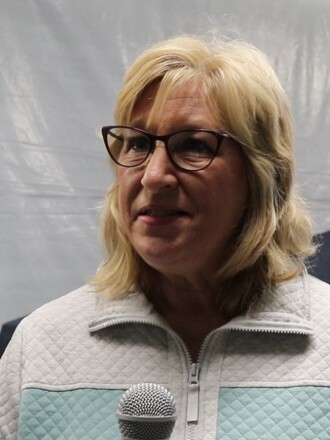LEWISTON, Minn. — The
is giving voice to farmers who feel they are the unfair target of a band of environmental groups in southeast Minnesota.
A group of around 30 gathered at Daley Farm in Lewiston on Monday, Nov. 27, for the second meeting of the alliance, which, according to its website, is a membership organization for farmers devoted to healthy soil, water and air. Voting members pay $150 or $500 depending on the size of their operation. Corporate or industry sponsors can also join as non-voting members for packages between $250 and $1,000.
Noah Fish / Agweek
The first meeting happened this summer at Rita Young’s farm, Emerald Spring Dairy near Plainview, which she operates with her husband and son. Young — who serves as president of the Driftless Area Ag Alliance — described the group as conservation focused and striving to motivate farmers to undergo practices that lead to healthy soil and clean water.
The group began less than a year ago, but Young said they’re already making strides with a community of farmers and conservation resources.
“What’s different from us is that we are farmer-led only, and we don’t have any outside CEOs or anything like that, and we are going to be learning from each other,” Young said. “We’re going to put into place measurable outcomes, so we can tell if this is making improvement or not.”
ADVERTISEMENT
The crowd of around 30 people left Nov. 27 with information from local conservation contacts including from the Mississippi River-Winona & La Crescent Watershed (also known as WinLaC), which drains 479,700 acres in four Minnesota counties. It includes the soil and water conservation districts in all those counties along with the Stockton-Rollingstone-Minnesota City Watershed District and the City of Winona.
Young said one goal of the gathering was to give farmers who don’t know where to begin their conservation journey a direction.
“Hopefully they’ll come in and learn, or get new ideas from the group,” she said.
It’s also a chance for the group, which includes several dairy farms in the region, to share the environmental work they do.
On the land where Young has been farming for 40 years, they plant cover crops and incorporate no-till practices, and much of the over 1,000 acres of crops they grow goes to feed their cattle, including about 500 acres of alfalfa.
She said conservation efforts by their farm and on the Daley Farm are going unnoticed by organizations like the 11 environmental groups in southeast Minnesota who pushed for federal intervention on nitrate contamination in the region.
Their emergency petition was answered by the EPA earlier this month.
Young said the EPA investigation, and what will come from it, is worrisome.
“It’s concerning that an activist group can have that kind of power, to bring in federal oversight,” Young said.
ADVERTISEMENT
In the past, she said her farm and others haven’t thought to publicize the work they’ve been doing with the environment in mind.
“We already do so many good things, but we kind of do it in our own little world, our own little silo, our own little business,” Young said. “We have to come together as a full force of farmers in southeast Minnesota, and everybody explain to the public, and to our federal authorities, that we are trying to improve the environment and improve the water quality.”
Crafted narrative
The Daley family has been using regenerative practices on the farm since Ben Daley’s father and uncle started over 45 years ago, and they passed the knowledge onto him and his brother, Brian.
At the Driftless Area Ag Alliance meeting on Nov. 27, Ben Daley detailed the conservation tactics that have worked the best for them over the years.
Noah Fish / Agweek
“The more people we get involved with doing the right things for the land, the better, and then I think everybody will benefit,” Daley said.
He said in the last 10 years, they’ve planted over 1,000 acres of cover crops, with 900 acres of alfalfa and 300 acres of pasture.
“Well over 80% of all of our land is covered in something green, and all three of those practices are known to help with water quality,” he said.
For more than 160 years, his family has been operating the dairy farm near Lewiston, and for the last decade they’ve been trying to expand from its current capacity of about 1,700 cows or 2,275 animal units.
ADVERTISEMENT
Ben Daley said that fighting their case in the courts
has brought more public attention to their farm, but it doesn’t impact how they manage it.
“It doesn’t affect our day-to-day,” he said of the Nov. 21 denial, which they plan to appeal. “It’s put your head down, get to work, do the right thing, and hopefully people will listen and see what’s actually happening instead of crafting a narrative.”
One of those narratives, which he said is untrue, is that more cows on the Daley Farm would be bad for water quality.
“We have manure storage that’s engineered and goes through rigorous regulations and rigorous inspections, and then we apply it at a rate that is monitored by the Minnesota Pollution Control Agency,” Daley said.
In the late 1980s when Daley was just a kid on his family’s farm, he took a mental note of the seriousness of a meeting among farmers and an agronomist. The group was taking a colorimetric analysis of nitrate in the soil. Colorimetric analysis is a method of determining the concentration of a chemical element or chemical compound in a solution with the aid of a color reagent.
The agronomist was Michael Schmitt, who is now associate dean and head of the University of Minnesota’s Department of Agricultural & Natural Resource Systems.
“I remember that from a young age — my dad and uncle being really concerned about that, then, as we are now,” Daley said.
